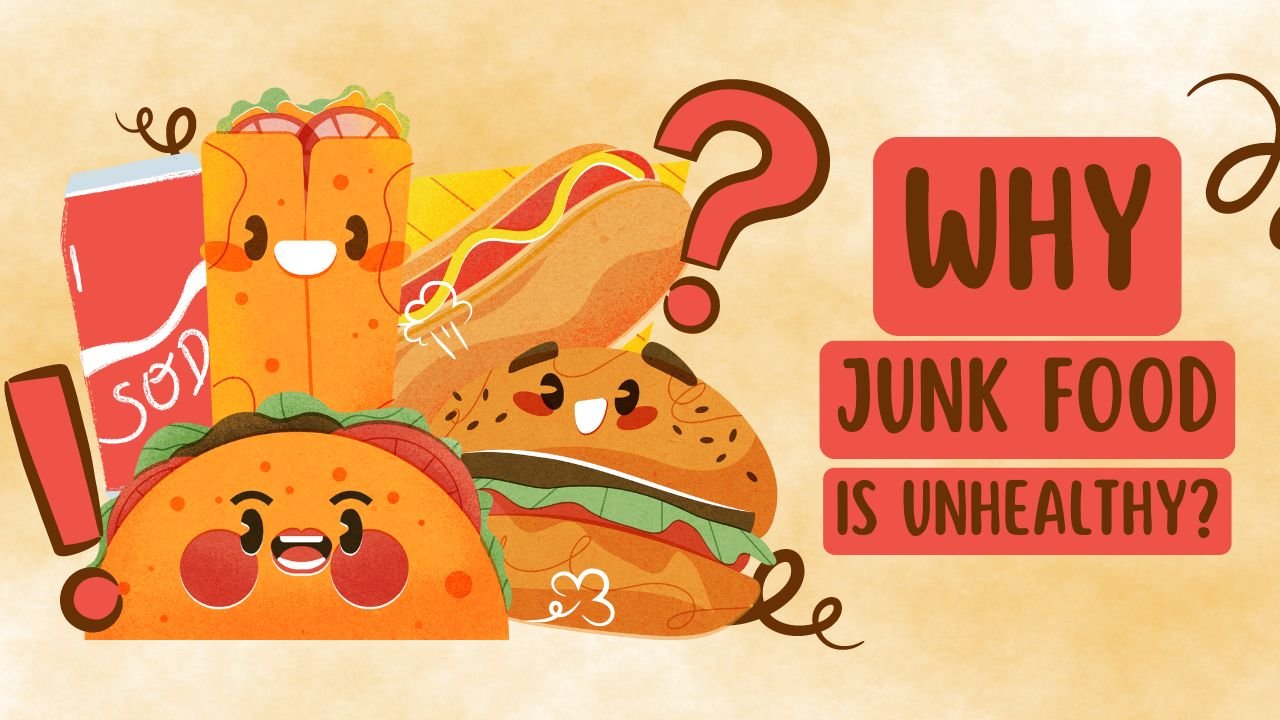In today’s post, we tackle an important topic: the effect of junk food on our health and society. In our “Essay on Junk Food in English,” we discuss its dietary prominence and consequences for health. With this ‘’ Essay on Junk Food in English’’, we will discuss why people prefer junk food, the negative impacts of junk food on health, and the recent highlighting of a healthy diet.
In our “Essay on Junk Food in English,” as we progress, the purpose will be to educate readers about the outcomes of consuming junk food. This “Essay on Junk Food in English” will make us realize its impact on individuals as well as on large groups of society.
Please welcome to our “Essay on Junk Food in English” Let us all embrace the message of change in the right way. We are expecting your view regarding this “Essay on Junk Food in English”.
Table of Contents
Introduction to Junk Food
Definition and Overview
Junk foods are specifically defined as foods with high energy densities and very low nutrient densities. Usually, these foods are trapped in high levels of sugar, unhealthy fats (trans fats), and salts, but lacking in essential vitamins, minerals, and fiber. Junk foods are typically made from convenience foods as these are easily processed to create value-added goods, are convenient to consume, and are aggressively promoted to consumers. This could include common commercial food like burgers and fries, soft drinks, salty snacks, and sweets. This essay on junk food in English discusses the classification of junk food, its health implications, social factors, and cultural outlooks.
Historical Context
Junk food was introduced towards the end of the eighteenth century and the beginning of the nineteenth century through innovations in food industrialization. The industry developed in the early twentieth century and gained its first real iconic figure in the form of the White Castle company, founded in 1921. The company introduced the idea of cheap meals that could be quickly prepared.
Thus, the United States experienced the greatest development and popularization of the fast-food industry, particularly during the 1950s, as McDonald’s restaurant chain rapidly grew to cover the country by the requirements of the new economic welfare, and the shifting consumer way of life. Thus, junk food was capable of becoming a sign of convenience and the modern way of life satisfaction; At the same time, this change represented the shifts in eating habits and the perspectives of future health problems.
Types of Junk Food
Fast Food
Fast foods are without a doubt the most familiar kinds of junk foods. These meals are normally cooked in haste and are sold in drive-throughs or through a counter. Key characteristics include:
- High-Calorie Density: In the past, most fast-food meals had between 600 and 800 calories, but large portions are now well over 1,000 calories per meal.
- Low Nutritional Quality: All kinds of fast foods lack some nutrients and are prepared using refined foods most of the time.
- Flavor Enhancements: Fast food companies use additives, flavorings, and other ingredients in foods and use techniques such as frying.
Sugary Snacks
Sweet snacks refer to various products that are extremely creamy and contain a high content of sugars and fats but are nutrient-deficient foods. This category includes:
- Candy: These products contain high-added sugars and are also associated with varieties meant for young children.
- Cookies and Pastries: These are foods that are rich in calories from sugars and undesirable fats and lack nutrients that are useful to the body.
- Sugary Breakfast Cereals: A large number of cereals with health benefits labeled on their packets contain high sugar content.
Processed Foods
Processed foods include any food that has been through some kind of processing to make it easier to prepare or safer to eat. This category can range from minimally processed items to highly processed snacks:
- Frozen Meals: Normally these meals are very rich in sodium and unfavorable fats making them convenient meals though are not healthy meals.
- Chips and Snack Foods: These are snacks manufactured from processed grains and often fried in non-healthy oils that contain many calories and very few nutrients.
- Instant Noodles: Most of these quick meals contain a lot of salt and other preservatives.
Nutritional Value and Health Risks
Impact on Physical Health
Regular consumption of junk food has been linked to numerous health issues, including:
- Nutritional Deficiencies: Consumption of junk food results in acute deficiencies of vitamins A, C, D, and calcium as well as iron.
- Metabolic Disorders: Consumption of high amounts of sugar and fats results in insulin resistance and metabolic syndrome, conditions that cause diabetes.
Connection to Obesity and Chronic Diseases
Real-life evidence shows that the consumption of junk foods directly leads to obesity. The combination of high-calorie, low-nutrient foods contributes to weight gain, which can escalate into obesity—a significant risk factor for numerous chronic diseases such as:
- Heart Disease: Saturated and Trans fats are potent sources that contribute to increased levels of cholesterol resulting in cardiovascular issues.
- Type 2 Diabetes: Consuming too much sugar in a population creates a problem that hampers insulin production and is poisonous to the body by raising high chances of diabetes.
- Certain Cancers: Obesity has been associated with other diseases such as breast, colon, and prostate cancer.
Psychological Effects of Junk Food
Cravings and Addiction
Experts’ opinion reveals that the observed effect of junk food consumption is functionally equivalent to that of an addiction. High levels of sugar and fat can lead to:
- Dopamine Release: A junk food triggers the pleasure centers which releases dopamine, hence promoting the habit.
- Food Cravings: Relying on the ability to make rational decisions, the brain may learn to link specific foods with satisfying the need immediately, so the cravings will be irresistible.
Impact on Mental Health
More recent studies however show that poor diets also have a negative way of influencing mental health. Consuming a lot of processed and sugary foods may lead to:

- Contribute to Depression and Anxiety: Some of the effects of nutrient-poor diets on the body include inflammation and control of neurotransmitters; these disorders may lead to mood disorders.
- Affect Cognitive Function: Consumption of high-sugar diets has been associated with poor memory and cognitive function at some point in time.
Societal Influences and Marketing
Targeting Young Audiences
The advertising of Junk food products’ tactical target customers mainly the young ones and the children. Strategies include:
- Use of Mascots and Characters: Most companies make use of easily identifiable personalities to help establish an attachment to the target group of the younger generation.
- Promotion of Sugary Drinks: There are always mentally related food adverts linking junk foods to enjoyment and related functions such as parties, and indeed promotions a favorable view in the minds of children.
Role of Advertising in Consumer Choices
The constant availability of junk food advertisements is likely to always impact the consumer’s food consumption decisions. Key points include:
- Media Saturation: Fast food and processed food products are very much inclined on TV, social media as well as other online platforms.
- Promotional Tactics: It is common to see companies offering discounted prices or offering bundles of products people do not need just to appeal to their emotions that buying something ‘now’ is better than getting it ‘later’.
Cultural Perspectives on Junk Food
Junk Food in Popular Culture
Junk food is part of the culture that is reflected in social attitudes towards them. Its representation includes:
- Film and Television: These are what make junk food appealing and regular, as portrayed by many movies whereby it is placed right in celebrations, parties, and other usually informal meetings, etc.
- Music and Art: It is worth mentioning that obsession with junk food is present in numerous works of art, where it serves as a kind of marker of the culture of consumption.
Regulation and Policy Responses
Government Interventions
In response to the health crisis associated with junk food, many governments are implementing regulatory measures, such as:
- Menu Labeling Laws: Requiring restaurants to prominently inform consumers about what they are consuming through the display of calorie and nutritional information.
- Taxation on Sugary Drinks: Due to increasing concern over the negative effects of the consumption of sugary products many areas have imposed taxes on such products.
Public Health Campaigns
Health organizations and governments are launching initiatives aimed at improving public awareness of the risks associated with junk food:
- Educational Programs: In schools, and communities, nutrition education is conducted to improve on the type of foods consumed by people.
- Social Media Campaigns: Using platforms to create awareness about the vice of eating junk foods often and encouraging more heathy foods.
Alternatives to Junk Food
Healthy Snack Options
It is possible to show healthy choices can help to eliminate cravings without affecting the health condition. Some examples include:

- Fresh Fruits and Vegetables: They include natural simple sugars and important nutrients making them better than other snacks containing refined sugars.
- Nuts and Seeds: These could be containing healthy fats and protein that can help meet the hunger and need for energy without the negative effects of processed snacks.
- Whole-Grain Products: Something like whole-grain crackers or popcorn is fiber and nutrients and still yummy.
Promoting Balanced Diets
Encouraging a balanced diet that integrates whole foods can help individuals make better food choices:
- Meal Planning Resources: Supporting information and counseling for planning meals can shift families towards healthier eating.
- Cooking Classes: This will help make people aware of how they can prepare healthy meals this will help reduce the instances of people depending on junk foods.
Conclusion of Essay on Junk Food in English
Summary of Key Points
Fast foods play arguably the largest health risk constituents, including obesity, chronic diseases or disorders, and impaired mental health. All these problems are made worse by the vigorous promotion of these products and culture that supports the consumption of convenience food. The issue of providing and consuming junk food can never be tackled singly within the rubric of only education or simply regulation or primarily promoting healthy eating.
Future Outlook on Junk Food Consumption
The impact of junk food on health being well understood and explained in the public domain it could be expected that new trends and healthier eating standards will be achieved. Junk food marketing restrictions relative to children may remain in force or be even intensified by governments and organizations. The food industry may adopt innovative food products and promotional techniques that reflect the changes in the economy and customer preferences.
Moreover, recent trends show an increasing popularity of plant-based and whole foods platforming a potential for up to 90% reduction in consumption of junk foods in the next decade. So, this essay on junk food in English emphasizes the spiraling nature of its consumption and abets to name it with the means to explore the choices being made healthier.
Thank You for Reading “Essay on Junk Food in English”!
The elimination of junk food from students’ diets is a hot topic that has garnered much concern from readers paying their attention to our blog post titled Essay on Junk Food in English. The contribution to this significant topic not only inspires but also helps to generate indispensable discussions on health and nutrition. Through the above “Essay on Junk Food in English,” you are now part of a society, which embraces knowledge about things concerning our feeding habits.
Thank you for visiting our blog post “Essay on Junk Food in English.” Your insights are invaluable and inspire us to continue addressing relevant issues that impact our lives. It’s amazing to see how great an impact our “Essay on Junk Food in English” has on most of you.
We hope that reading our “Essay on Junk Food in English”, assists you in developing a thought about food and its relationship with health. This is why your support is commendable in raising awareness of these issues and for that, we appreciate your contributions to this discourse. The talks arising from our “Essay on Junk Food in English” emphasize the need to make some decisions in the matter of nutrition carefully.
We hope you enjoy “Essay on Junk Food in English”. Your interest in what we do encourages us to explore these issues further. Thank you for being here on this road to improving our health and kindness. With this aid, we also shall act responsibly and encourage others to so act about the “Essay on Junk Food in English.” Thank you once again for visiting our blog post “Essay on Junk Food in English”.

